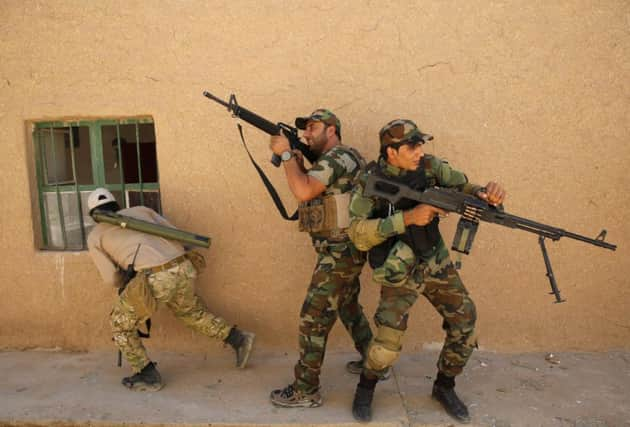John Kerry looks to Arab nations to help halt IS


Kerry met with Arab League chief Nabil al-Arabi and Egyptian president Abdel Fattah al-Sisi in Cairo and said the country had a critical role to play in countering the hardline Islamist group, which has seized swathes of Iraq and Syria.
He has enlisted the support of ten Arab states so far, including Egypt, Saudi Arabia and Qatar, but on Friday he ruled out Iran joining the US-led coalition.
Advertisement
Hide AdAdvertisement
Hide AdKerry has also appeared to play down how fast countries can commit to force or other steps in an emerging coalition.
His meeting yesterday followed a summit with Turkish leaders on Friday to try to secure backing for action against IS militants.
But Turkey is reluctant to play a frontline role, which highlights the difficulty of building a willing coalition for a complex military campaign in the heart of the Middle East.
As he tours the region to gather support for President Barack Obama’s plan to strike both sides of the Syrian-Iraqi frontier to defeat Islamic State Sunni fighters, Kerry said Shiite Iran should have no role in talks on how to go about it.
Accusing Iran of being “a state sponsor of terror” and backing Syria’s brutal regime, Kerry said it would be inappropriate for Iranian officials to join an Iraq conference in Paris tomorrow to discuss how to curb a jihadist movement that has seized a third of both Iraq and Syria.
Tehran – which is widely reported to have special forces troops on the ground in Iraq to help the Iraqi government and the Kurds – has described the coalition as “shrouded in serious ambiguities”.
“Under the circumstances, at this moment in time it would not be right for any number of reasons,” Kerry told a news conference in the Turkish capital Ankara on Friday.
“It would not be appropriate given the many other issues that are on the table in Syria and elsewhere.”
Advertisement
Hide AdAdvertisement
Hide AdFaced with disparate interests and goals among the region’s often squabbling nations, Kerry said it was too early to say publicly what individual countries were prepared to do in a broad front to cut off funds to the militants, encourage local opposition and provide humanitarian aid.
Kerry won backing on Thursday for a “coordinated military campaign” against Islamic State from ten Arab countries – Egypt, Iraq, Jordan, Lebanon and six Gulf states including Saudi Arabia and Qatar.
But it remains far from clear what role the individual nations will play. While he confirmed France’s commitment to use military force in Iraq, he declined to say whether France would join strikes in Syria.
That follows conflicting reports in key ally Britain over its potential role, with Prime Minister David Cameron on Thursday saying he has not ruled out military action in Syria after foreign secretary Philip Hammond said Britain would not take part in air strikes there.